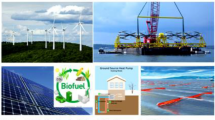Abstract
The world population is growing by almost 216,000 individuals per day – or in 1 year by 79 million (US Census Bureau 2011). By 2050, the global population will increase by about one third to surpass 9 billion. Most of the additional 2.3 billion people will enlarge the population of developing countries, which is expected to rise to 7.9 billion in 2050 (UN DESA 2009). By this time, Africa’s population will double with a growth of about 24 million per year while Asia’s share of world population may continue to cover around 60% (Population Reference Bureau 2009). Who will provide this new population with energy? How will the urban and rural poor pay even for the minimum energy services they require? What will be done to relieve the inevitable stress on the environment? These are very difficult questions to answer. What is clear is that population growth and rising expectations of living standards represents colossal challenges for the world energy sector.
Access this chapter
Tax calculation will be finalised at checkout
Purchases are for personal use only
Similar content being viewed by others
Notes
- 1.
The HDI measures the average achievements in a country in three basic dimensions of human development:
-
A long and healthy life, as measured by life expectancy at birth.
-
Knowledge, as measured by the adult literacy rate (with two-thirds weight) and the combined primary, secondary, and tertiary gross enrolment ratio (with one-third weight).
-
A decent standard of living, as measured by the gross domestic product (GDP) per capita in purchasing power parity (PPP) in terms of US dollars.
-
References
Benchikh, O., & Courvello, A. (2004). Renewable energy in Latino America and the Caribbean region. Paris: UNESCO.
G8 Energy Ministers Meeting. (2009, May 24–25). Africa energy poverty. Rome.
International Energy Agency [IEA]. (2010). World energy outlook 2010. Paris: OECD/IEA.
Population Reference Bureau. (2009). The 2009 world population data sheet. Washington, DC: Population Reference Bureau.
UN General Assembly 55/2. (2000, September 18). United Nations Millennium Declaration. Resolution adopted by the General Assembly, A/RES/55/2. http://www.un.org/millennium/declaration/ares552e.htm. Accessed December 12, 2011.
United Nations Department of Economic and Social Affairs [UN DESA], Population Division. (2009). World population prospects: The 2008 revision highlights (Working Paper No. ESA/P/WP.210). New York: United Nations.
US Census Bureau. (2011). International Data Base (IDB). http://www.census.gov/population/international/data/idb/informationGateway.php. Accessed February 8, 2011.
Author information
Authors and Affiliations
Corresponding author
Editor information
Editors and Affiliations
Rights and permissions
Copyright information
© 2012 Springer Paris
About this chapter
Cite this chapter
Benchikh, O. (2012). Renewable Energy for Development and Climate Change Mitigation. In: Bolay, JC., Schmid, M., Tejada, G., Hazboun, E. (eds) Technologies and Innovations for Development. Springer, Paris. https://doi.org/10.1007/978-2-8178-0268-8_3
Download citation
DOI: https://doi.org/10.1007/978-2-8178-0268-8_3
Published:
Publisher Name: Springer, Paris
Print ISBN: 978-2-8178-0267-1
Online ISBN: 978-2-8178-0268-8
eBook Packages: Business and EconomicsEconomics and Finance (R0)




